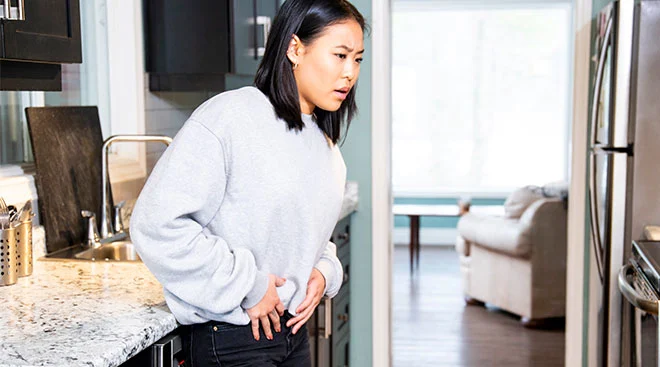Morning Sickness: What Causes It and How to Find Relief
Morning sickness: Consider it the first of many concessions you’ll make to your child in your journey as a mother. The swirly-head nausea and vomiting that often accompanies early pregnancy is far from fun—in fact, it can be downright debilitating. Unfortunately, for many expectant mothers, it’s par for the course. So when does morning sickness start—and more importantly, how can you find morning sickness relief? We’ve asked top doctors to dish on everything you need to know about morning sickness during pregnancy.
Morning sickness refers to the nausea and vomiting many women experience as a symptom of their pregnancy. And while it can be less than pleasant, it’s super-common: Nausea and vomiting impacts 70 to 80 percent of all pregnant women. You may just feel queasy, or you might actually throw up. And while the name suggests that sickly sensation only rears its head in the a.m., “morning sickness” can in fact happen at any hour of the day.
As common as it is, no one knows exactly what causes morning sickness. Experts say it likely relates to the rising rush of hormones coursing through your body when you first become pregnant. The main culprit: Human Chorionic Gonadotropin (hCG), a hormone produced by cells formed in the placenta—the one that essentially tells your body you’re pregnant.
“Morning sickness is probably under-researched and under-appreciated, but we do know it correlates pretty well with the hormone hCG,” says Matthew Hoffman, MD, chair of obstetrics and gynecology for Christiana Care. HCG levels in pregnant women tend to peak at 10 weeks, he explains—about the same time that morning sickness does too. “There are a lot of thoughts about why mothers get it, and most project that at that time in pregnancy—when baby has minimal nutritional needs and all organs are forming—it may be a way to prevent moms from ingesting things that are toxic to baby,” he says. The higher levels of hCG in your body, the more apt you are to suffer from morning sickness. This includes mothers pregnant with twins.
It also doesn’t help that your sense of smell is extra sensitive early in pregnancy, so if you’re already slightly nauseous, certain odors can exacerbate your morning sickness.
Nausea and vomiting can be among the first signs that you’re pregnant—so when does morning sickness start, exactly? There are no hard and fast rules for exactly when you’ll first feel nauseous, but morning sickness typically starts in the first or second month of pregnancy and becomes intense around nine or 10 weeks. “Symptoms depend on the woman and pregnancy, but typically you’ll feel nauseous within the first five or six weeks after you miss your period,” says Julie Visk, CNM, a certified nurse-midwife in the department of obstetrics and gynecology at Thomas Jefferson University Hospital.
Many mothers do feel sick first thing in the morning, since less food in your stomach means more gastric acid, which might make your stomach hurt. But remember, “morning sickness” can occur any time during the day, triggered by certain smells, foods, size of meals and motion.
For some expectant moms, morning sickness ebbs and flows throughout the day; for others, it might hit at a certain time, like just before midday. Overall, symptoms improve for most women by the end of the second trimester.
“Most people tend to feel it resolving on its own somewhere between 14 and 16 weeks,” says Visk. “Some are unlucky—for them, morning sickness can last until closer to halfway through pregnancy. The really unlucky, maybe 15 percent, may experience morning sickness all the way to the end of pregnancy.”
Depending on your threshold for pain and discomfort, you may be able to work through the nausea and make it to bedtime. Some expectant mothers feel ill during their commute or while driving; morning sickness can make you prone to motion sickness. It can also be triggered by things like perfume, cooking food or warm, cloistered air. Oh, and watch the drool: Excessive saliva, associated with nausea, can sometimes make things worse. Drinking water, eating mints or chewing gum might help, says Kelly Walker, CNM, director of the midwifery program at Georgetown’s School of Nursing & Health Studies.
The unluckiest of us find the dizziness and nausea unbearable, as it can prompt stomach pain and persistent vomiting. If your symptoms are relentless—lots of vomiting before you’re nine weeks pregnant—you may be among the 2 percent of pregnant women suffering from severe morning sickness, otherwise known as hyperemesis gravidarum. Signs you might have this acute form of morning sickness include:
- You’re throwing up five or more times a day
- You’re losing weight, down 5 percent or more of your pre-pregnancy weight
- You’re having strong cramps or pain in your belly
- You have signs of dehydration: you’re not urinating much, your urine is dark, you feel weak and/or you’re dizzy when you change positions
- You should call your doctor or midwife if you experience any of these symptoms—they’ll do some lab tests to check how dehydrated you are and may need to give you IV fluids
The good news is that having morning sickness during pregnancy won’t harm your growing baby. If you’re experiencing nausea or vomiting early on in pregnancy and can’t bring yourself to eat much, don’t stress—baby will be just fine. “It’s okay to gain weight very slowly in the first part of pregnancy, or even lose some weight in the first trimester—babies gain most of their weight at the end,” says Visk. As you get further along in your pregnancy and no longer feel queasy, your appetite will return, just when baby needs that fuel the most.
“The most important thing we worry about is whether you’re staying hydrated,” Visk adds—so make sure to drink fluids throughout the day and be on the lookout for signs of dehydration. If you can’t keep any food down at all, it may be a sign of a more serious condition, such as hyperemesis gravidarum, which can affect baby. Be sure to stay in contact with your doctor if you’re struggling with morning sickness.
So what helps morning sickness? Nausea and vomiting are tough to contend with, but luckily there are ways to find morning sickness relief. Many of the morning sickness remedies out there are things you can do at home on your own; if those don’t cut it, there may be some other options your health care provider can recommend. Here, some possible morning sickness treatments.
Foods for morning sickness
Talk to your provider about home remedies for morning sickness—you can find many antidotes in your fridge or on your pantry shelves. Whether you’re looking for something to relieve the nausea or some eats you can actually keep down, here are a few of the best foods for morning sickness:
• Ginger. Research shows that ginger, in many forms, can relieve nausea and vomiting. “Ginger in and of itself as an herb works really well—ginger tea, ginger lollipops, ginger ale,” says Visk.
• Cold, fizzy refreshments. Visk recommends carbonated drinks like ginger ale or seltzer, or a glass of chilled lemonade or ice water with mint or lemon.
• Shakes and smoothies. Try cold juices, shakes and smoothies that you can pack with fruits and veggies to help you get your nutrients.
• Bland foods. “Other good choices of foods are things that are bland and have a lot of carbs versus a lot of fat content, like saltines, chips, toast and foods that aren’t super spicy or aren’t associated with strong smells,” Visk says. A BRAT diet of bananas, rice, applesauce and toast can be a good go-to if you’re concerned about keeping food down.
• Water-packed fruit. Juicy fruits, especially those that have high water content, can help too. Experiment with watermelon and oranges to start.
Tips and home remedies for morning sickness
Some simple changes to your routines can also help provide some morning sickness relief. Try the following tips:
• Eat something small right when you wake up. Having a saltine cracker or two before you crawl out of bed helps neutralize gastric acid.
• Eat small, frequent meals. Little amounts of food are easier for your stomach to digest.
• Pay attention to what grosses you out. Stay away from food and smells that turn your stomach, and “don’t be adventurous when it comes to new foods,” says Visk.
• Don’t lay down right after eating. Your body has a much easier time digesting food when it’s upright; lying down after a meal can lead to indigestion.
• Rethink your prenatal vitamin. If you’re regularly throwing up those huge pills, talk to your provider about other options, which may include something with just folic acid, says Visk. Also, try taking your vitamin at night.
• Invest in acupressure wrist bands. These little fabric bands relieve motion sickness for some people; they may help when you’re pregnant too.
Morning sickness medication
If home remedies for morning sickness aren’t doing enough to make you feel better, call your doctor. They may recommend taking over-the-counter drugs like Benadryl, Dramamine or a combination of vitamin B6 (three times a day) and doxylamine, otherwise known as Unisom (once a day, at bedtime). For severe morning sickness, there’s a handful of anti-vomiting medications doctors and midwives can prescribe.
It’s ironic that in most cases, morning sickness can be a sign that your pregnancy is progressing well. Of course, if you’re lucky enough to feel no morning sickness and baby is growing satisfactorily, there’s nothing to worry about. “You don’t want patients thinking, ‘I don’t have morning sickness but my sister did so there must be something wrong with me,’” says Walker. “That’s not the case—morning sickness is common but not everyone experiences it.”
Visk adds: “Thank your lucky stars and don’t brag too much about it!”
Your healthcare provider should spend a good chunk of time at your first pregnancy visit assessing your condition and talking about what to know and expect about morning sickness. If you face symptoms soon after that first visit, call them back and ask to move up your next appointment. “Reaching out early is always better than pining away at home,” says Hoffman, noting that talks with your provider usually help mitigate morning sickness without you having to come into the office or emergency room.
Call immediately if you’re experiencing signs of dehydration or if the morning sickness is impacting your quality of life. “If you’re able to stand and get through your day, you should know that the condition generally isn’t dangerous,” says Visk. “There’s usually an end in sight, and babies do just fine throughout morning sickness.”
Please note: The Bump and the materials and information it contains are not intended to, and do not constitute, medical or other health advice or diagnosis and should not be used as such. You should always consult with a qualified physician or health professional about your specific circumstances.
Plus, more from The Bump:
Matthew Hoffman, MD, MPH, FACOG, is an ob-gyn with Christiana Care Health System, where he serves as the chair of obstetrics and gynecology as well as the director of obstetrical and gynecological research. He earned his medical degree in 1991 from the University of Florida College of Medicine in Gainesville.
Julie Visk, CNM, MSN, is a certified nurse-midwife in the department of obstetrics and gynecology at Thomas Jefferson University Hospital in Philadelphia.
Kelly Walker, CNM, DNP, is the director of the nurse-midwifery and women’s health nurse practitioner program at Georgetown’s School of Nursing & Health Studies. She holds a doctorate in nursing practice from Stony Brook University
Integrative Medicine Insights, The Effectiveness of Ginger in the Prevention of Nausea and Vomiting during Pregnancy and Chemotherapy, March 2016
Learn how we ensure the accuracy of our content through our editorial and medical review process.
Navigate forward to interact with the calendar and select a date. Press the question mark key to get the keyboard shortcuts for changing dates.
Advertisement
Advertisement
Advertisement
Advertisement




















































